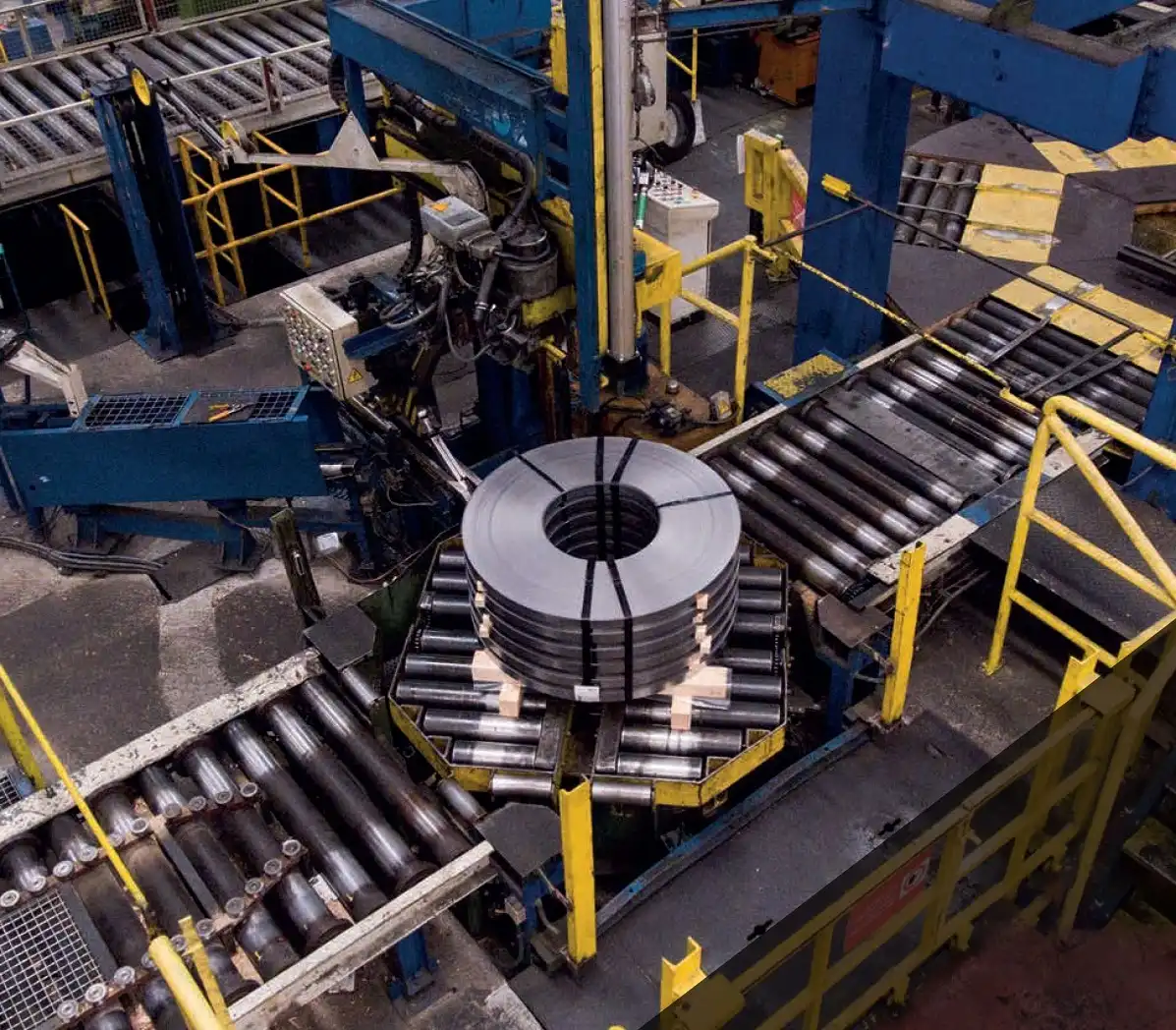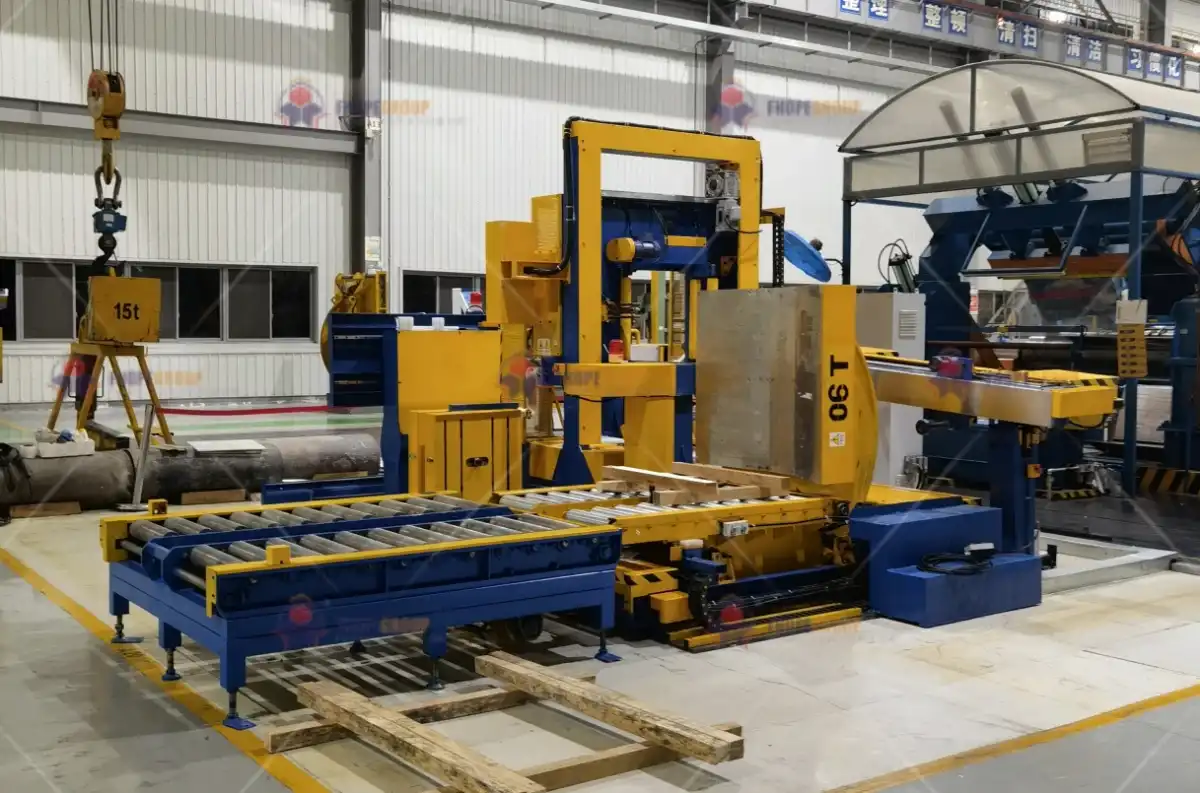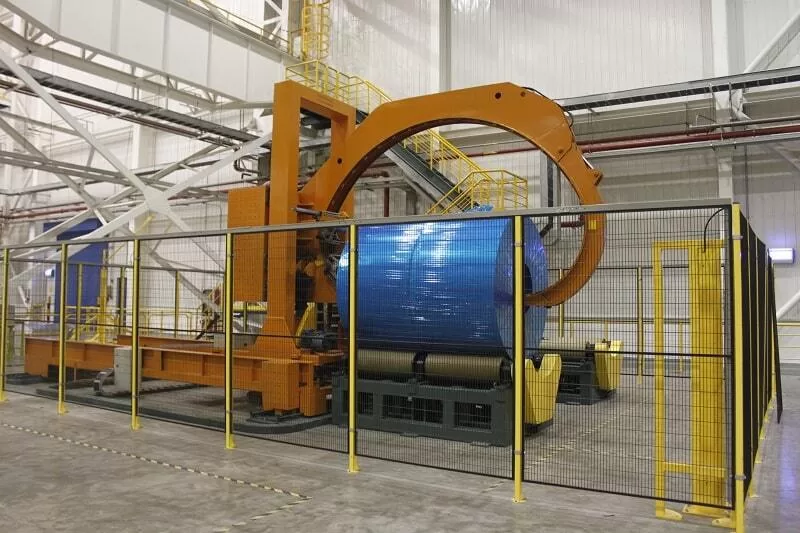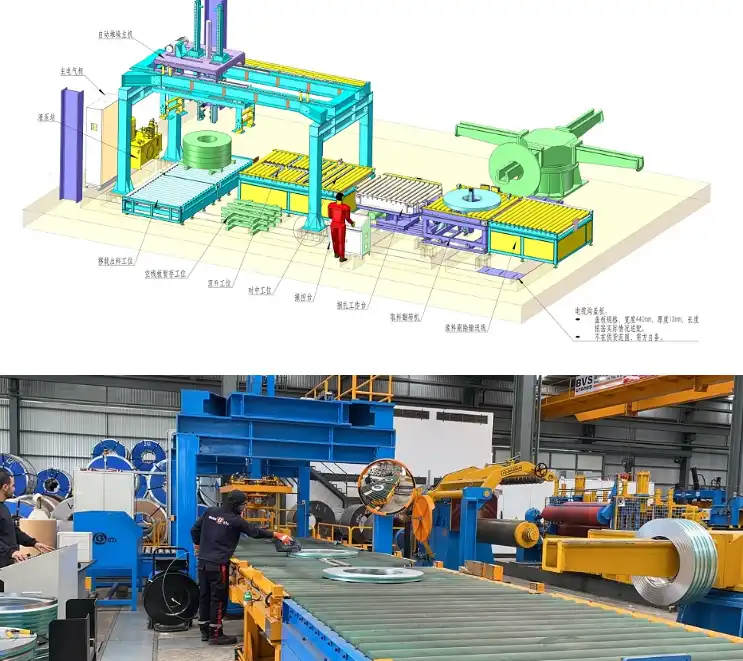You have invested a significant amount of capital into a state-of-the-art steel coil packing line for your facility in Indonesia. Everything runs smoothly, and production is on schedule. But then, a small sensor fails, or a mechanical part gives out. Suddenly, your entire line grinds to a halt. Every minute the line is down, you are losing money, missing shipping deadlines, and facing a growing backlog. The pressure mounts as you try to get support from a supplier thousands of kilometers away, across different time zones. The initial savings on a machine without local support can evaporate in just a few hours of downtime. This scenario is a common fear for many plant managers, but it doesn't have to be your reality.
Local after-sales support in Indonesia directly impacts your steel coil packing line's performance by dramatically reducing downtime, lowering long-term operational costs, and guaranteeing consistent output. An accessible, in-country team provides a rapid response for repairs, proactive maintenance scheduling, and a local inventory of spare parts. This ensures your packing line achieves maximum uptime, protecting your investment and boosting your plant's overall productivity.

This isn't just about convenience; it's a core strategic decision. The difference between waiting weeks for an overseas technician and having an expert at your factory door in hours is the difference between a minor hiccup and a major financial loss. Let’s explore exactly how a strong local support system in Indonesia can become one of your most valuable operational assets.
What Happens When Your Packing Line Fails Without Quick Local Support?
Imagine this common situation. It’s the middle of a busy production shift at your plant in Jakarta or Surabaya. A critical component on your packing line breaks down. Your entire output stream stops. The clock is ticking, and every stalled minute costs you money. You get on the phone, trying to explain a complex technical problem to a support agent in a different country, possibly struggling with a language barrier and a 5-hour time difference. The frustration is immense. This isn't just a technical problem; it's a direct threat to your production targets and profitability. The solution you need isn't just a replacement part; it's immediate, expert help on the ground.
When your packing line fails without quick local support, you face extended and extremely expensive periods of downtime. Each hour of inactivity means lost production volume, delayed customer shipments, and the risk of financial penalties from your clients. The absence of a local technical team means you are forced to wait for international flights to be booked, for spare parts to navigate complex customs procedures, and for communication issues to be sorted out. A simple mechanical failure can easily turn into a multi-day operational crisis that damages both your revenue and your reputation.

Dive Deeper: The Cascading Costs of a Single Failure
The immediate problem is the stopped machine, but the true damage spreads throughout your entire operation like a shockwave. As an engineer who has managed factory floors, I've seen firsthand how a single point of failure can paralyze a business. The packing line is often the final checkpoint before shipment. When it stops, everything upstream gets backed up. Your slitting lines may have to stop, your rolling mills might need to slow down, and your entire production schedule is thrown into chaos. This creates a massive bottleneck that affects every part of your process.
Let's talk about the direct financial bleeding. The costs are not just theoretical. They are real and they add up fast. Think about the idle labor costs for the operators on that line. Consider the lost revenue for every coil that isn't packed and shipped. For a medium-sized steel mill in Indonesia, this can easily be thousands of dollars per hour.
| Cost Factor | Impact of No Local Support |
|---|---|
| Lost Production | Every hour of downtime is an hour of zero output. |
| Idle Labor | Your skilled operators are paid to wait, not to work. |
| Shipping Penalties | Failure to meet delivery deadlines can trigger costly contract clauses. |
| Reputation | Unreliable delivery schedules damage trust with your customers. |
| Overhead Costs | Your factory's fixed costs (electricity, rent) continue even when production stops. |
Beyond these direct costs are the hidden ones. There's the immense stress placed on your management team, who have to deal with angry customers and rearrange logistics. Then there's the nightmare of arranging international support. This involves visa applications, flight bookings, hotel accommodations, and daily allowances for the visiting technician. And the biggest headache of all can be getting a simple spare part into Indonesia. It can get stuck in customs for days, all while your multi-million dollar production line sits idle. I remember a client who saved a small percentage on a machine from a supplier with no Indonesian presence. They lost that entire "saving" and more during their first major breakdown, which lasted over a week.
How Can Local Technicians Reduce Your Total Cost of Ownership (TCO)?
When you evaluate a new piece of equipment, it's easy to focus on the initial purchase price. But as a seasoned factory owner knows, that's just the tip of the iceberg. Have you considered the full lifetime cost of your steel coil packing line? The maintenance, repairs, spare parts, and potential downtime over its 15 or 20-year lifespan are the costs that truly determine your return on investment. Relying on a reactive, "break-fix" approach with distant support can make these hidden costs spiral out of control. A smarter financial strategy focuses on the Total Cost of Ownership (TCO), and a local technical team is the key to managing it effectively.
Local technicians significantly reduce your Total Cost of Ownership (TCO) by minimizing expensive, unplanned downtime and cutting out the high costs tied to international service calls. Their quick response times, lower travel expenses, and ability to provide regular, affordable maintenance ensures your machine operates at peak efficiency. This maximizes its productive life and makes your initial capital investment far more profitable over the long term.

Dive Deeper: Looking Beyond the Price Tag
The Total Cost of Ownership is a simple but powerful concept. It includes every cost associated with the machine from the day you buy it to the day you retire it. Let's break it down. TCO is the Initial Purchase Price (IPP) plus all Operational and Maintenance costs. A supplier without a local Indonesian team can only compete on the IPP. A true partner helps you lower the other, larger costs.
Operational costs include things like energy and consumables. A machine that is regularly tuned and maintained by local experts will run more efficiently, consuming less power and using wrapping materials more effectively. But the biggest impact is on maintenance and repair costs. Here is a clear comparison of how these costs differ with and without local support.
| Cost Factor | Without Local Support | With Local Support in Indonesia |
|---|---|---|
| Technician Travel Costs | High (International flights, hotels, visas, per diem) | Low/None (Local transportation) |
| Technician Response Time | Days or even weeks | A matter of hours |
| Downtime Cost per Incident | Extremely high due to long waits | Minimal, contained to hours |
| Spare Parts Logistics | Slow international shipping, customs delays | Fast delivery from a local stock |
| Preventive Maintenance | Very expensive and difficult to schedule | Easy, affordable, and regularly scheduled |
As you can see, the financial benefits of having a local team are enormous. The cost of flying a technician from Europe or China for a one-day repair can be more than the cost of a full year's service contract with a local team. I've seen clients in Indonesia who used to schedule maintenance only once every two years because it was so expensive and disruptive to bring in foreign experts. Now, with local support, they can have their lines checked every quarter for a fraction of the cost, catching small problems before they become major failures. This proactive approach not only saves money on repairs but also extends the productive life of the equipment, pushing back the need for another huge capital investment.
Why is Proactive Maintenance from a Local Team a Game-Changer?
Many factories operate on a "break-fix" cycle. A machine runs until it fails, and then there's a frantic scramble to fix it. This reactive model is inherently stressful, inefficient, and expensive. It puts you at the mercy of unexpected events. But what if you could change the rules of the game? What if you could anticipate potential issues and address them during planned, scheduled shutdowns? This would practically eliminate unplanned downtime. This isn't just a dream; it is the powerful reality of proactive maintenance, and it's only truly possible with an accessible local support team.
Proactive maintenance from a local team is a game-changer because it transforms your operations from a reactive "firefighting" mode to a predictive and controlled model. A local team in Indonesia can conduct regular inspections, analyze your machine's performance, identify parts showing wear, and replace them before they can fail. This is like getting your car serviced regularly to prevent a breakdown on the highway. It ensures your packing line achieves maximum availability and performs consistently, turning it into a reliable asset rather than a source of uncertainty.

Dive Deeper: Shifting from Reaction to Prevention
The difference between a reactive and proactive strategy is fundamental. A reactive strategy means you wait for a problem. A proactive strategy means you prevent the problem from ever happening. For a steel mill aiming for high efficiency, like achieving 95% equipment uptime, a proactive strategy is not optional—it's essential. A local team is the engine that drives this strategy.
Here’s how a local team in Indonesia makes proactive maintenance a reality. First, they can perform regular, scheduled inspections. Because they are based locally, these visits are cost-effective and easy to plan. A technician can visit your plant quarterly to check critical systems, lubricate components, and calibrate sensors. During these visits, they build deep familiarity with your specific machine. They learn its unique operational sounds and behaviors. They also build a strong working relationship with your operators, who feel comfortable asking questions and pointing out small concerns.
Furthermore, a dedicated local team can help you implement a data-driven approach. They can help you analyze fault logs and performance data from your packing line's control system. This data can reveal patterns that predict future failures, allowing you to replace a specific motor or bearing before it seizes up. This is the first step toward the kind of predictive maintenance that leading industrial plants are adopting. A local team can also provide ongoing operator training in Bahasa Indonesia. When your own staff knows how to perform daily checks and spot early warning signs, they become your first line of defense against downtime. They are empowered to handle minor issues themselves and can provide better information to technicians when a problem does arise. Ultimately, this comprehensive, hands-on support from a local team is what allows you to move away from hoping your line doesn't break and toward a clear, structured plan to ensure it never does.
My Insights: Beyond a Quick Fix, What Does True Local Partnership in Indonesia Mean?
I've seen many equipment suppliers advertise "local support." Too often, this turns out to be nothing more than a contact number for a sales agent who can't provide any real technical help. When a critical breakdown happens at 2 AM, you quickly discover there are no local engineers, no local spare parts inventory, and no real support system. As an engineer who started on the factory floor and later built my own packing machine factory, I know the deep frustration and financial damage this kind of empty promise can cause. A true local partnership is about so much more than having a phone number in the same country.
A true local partnership in Indonesia means having a dedicated team on the ground that is genuinely invested in your success. It’s not just about fixing a machine when it breaks. It's about providing continuous technical guidance, training your operators in their native language, helping you adapt to local market demands, and serving as a strategic advisor. It’s a commitment to help your steel business not just operate, but thrive and grow.

Dive Deeper: My Philosophy on Partnership
My journey in this industry has shaped my entire business philosophy. I didn’t just design and sell machines; I operated them, maintained them, and felt the pressure when they went down. I achieved financial independence thanks to the opportunities this industry gave me. Now, at SHJLPACK, my mission is to give back by helping others succeed. For me, that means building genuine partnerships, especially in dynamic markets like Indonesia.
A true partnership is built on shared goals. Our success at SHJLPACK is directly tied to your operational success. We want your packing line to have the highest possible uptime because your success is the best testament to the quality and reliability of our equipment. It's a win-win relationship.
This partnership must be built on a foundation of cultural and language fluency. Clear communication is critical in a technical field. Having engineers who speak Bahasa Indonesia and understand the local business etiquette removes friction and builds the deep trust needed for a long-term relationship. It means we can train your team more effectively and understand the nuances of your challenges.
Finally, a true partner provides strategic advice. The conversation should not be limited to the packing line itself. We should be discussing how this equipment helps you meet your larger business goals. Are you aiming to reduce energy consumption? Let's talk about energy-efficient motors and programming. Are you pursuing digitalization? Let's discuss how our machine's data can integrate with your MES platform. At SHJLPACK, we are committed to building a real support ecosystem in Indonesia. This means investing in a team of well-trained local engineers, maintaining a warehouse with critical spare parts, and being a resource you can rely on. This is my promise—to provide the support I wish I had when I was building my own business.
Conclusion
Ultimately, choosing a supplier with robust local after-sales support is not an expense. It is a strategic investment in the performance, reliability, and profitability of your steel coil packing line in Indonesia.





